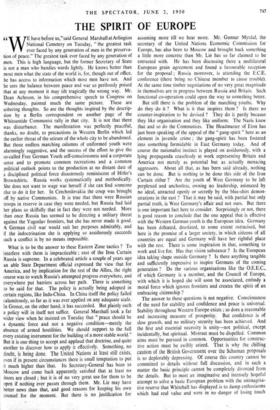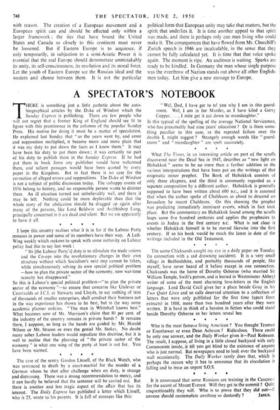THE SPIRIT OF EUROPE
CC E have before us,"said General Marshall at Arlington National Cemetery on Tuesday, " the greatest task ever faced by any generation of men in the preserva- tion of peace." The greatest task ever faced by any generation of men. This is high language, but the former Secretary of State is not a man who bandies words lightly. He knows better than most men what the state of the world is, for, though out of office, he has access to information which most men have not. And he sees the balance between peace and war so perilously poised that at any moment it may tilt tragically the wrong way. Mr. Dean Acheson, in his comprehensive speech to Congress on Wednesday, painted much the same picture. These are sobering thoughts. So are the thoughts inspired by the descrip- tion by a Berlin correspondent on another page of the Whitsuntide Communist rally in that city. It is not that there was disturbance. The manifestation was perfectly peaceful, thanks, no doubt, to precautions in Western Berlin which led the earlier threat of the seizure of the whole city to be abandoned. But those endless marching columns of uniformed youth were alarmingly. suggestive, and the success of the effort to give the so-called Free German Youth self-consciousness and a corporate sense and to promote common recreations and a common political- outlook points to the production at no distant date of a disciplined political force disastrously reminiscent of Hitler's Brownshirts. Russia works systematically and methodically. She does not want to wage war herself if she can find someone else to do it for her. In Czechoslovakia the coup was brought off by native Communists. It is true that there were Russian troops in reserve in case they were needed, but Russia had laid her plans so skilfully that in fact they were not needed. More than once Russia has seemed to be directing a military threat against the Yugoslav frontiers, but she has never made it good. A German civil war would suit her purposes admirably, and if the indoctrination she is applying so assiduously succeeds such a conflict is by no means impossible.
What is to be the answer to these Eastern Zone tactics ? To interfere with them is impracticable ; east of the Iton Curtain Russia is supreme. In a celebrated article a couple of years ago an able State Department official expressed the view that for America, and by implication for the rest of the Allies, the right course was to watch Russia's attempted progress everywhere, and everywhere put barriers across her path. There is something to be said for that. The policy is actually being adopted in certain regions, like Indo-China. In China itself the policy failed calamitously, so far as it was ever applied on any adequate scale. In Greece, on the other hand, it has succeeded. But plainly such a policy will in itself not suffice. General Marshall took a far wider view when he insisted on Tuesday that " peace should be a dynamic force and not a negative condition—merely the absence of armed hostilities. We should support to the full every existing instrument for the building of a more stable world." But it is one thing to accept and applaud that doctrine, and quite another to discover how to apply it effectively. Something, no doubt, is being done. The United Nations at least still exists, even if in present circumstances there is small temptation to put it much higher than *that. Its Secretary-General has been to Moscow and come back apparently satisfied that at least no doors are closed ; but it is of no very great use for them to be open if nothing ever passes through them. Mr. Lie may have better news than that, and good reasons for keeping his own counsel for the moment. But there is no justification for assuming more till we hear more. Mr. Gunnar Myrdal, the secretary of the United Nations Economic Commission for Europe, has also been to Moscow and brought back something a little more concrete than Mr. Lie has so far claimed to be entrusted with. He has been discussing there a multilateral European grain agreement and found a favourable reception for the proposal ; Russia moreover, is attending the E.C.E. conference (there being no Chinese member to cause trouble).
At the same time timber negotiations of no very great magnitude in themselves are in progress between Russia and Britain. Such functional co-operation could open the way to something better. But still there is the problem of the marching youths. Why do they do it ? What is it that inspires them ? Is there no counter-inspiration to be devised ? They do it partly because they like organisation and they like uniform. The Nazis knew that and so do the Communists. The Headmaster of Eton has just been speaking of the appeal of the "gang-spirit " here as an element in juvenile crime ; the gang-spirit has been fostered into something formidable in East Germany today. And of course the nationalist instinct is played on assiduously, with a lying propaganda ceaselessly at work representing Britain and America not merely as potential but as actually menacing aggressors. About all that, as has been said already, nothing can be done. But is nothing to be done this side of the Iron Curtain either ? Are the youth of West Germany to be left perplexed and anchorless, owning no leadership, animated by no ideal, attracted openly or secretly by the blue-shirt demon- stratipns in the east ? That it may be said, with partial but only partial truth, is West Germany's affair and not ours. But there is one important fact here to consider. Surprisingly or not, there is good reason to conclude that the one appeal that is effective with the Western German youth is the European idea. Germany has been defeated, desolated, to some extent ostracised, but here is the promise of a larger society, in which citizens of all countries are equal and Germany will have her rightful place with the rest. There is some inspiration in that, something to work and live for. Has that vision substance ? Is the European idea taking shape outside Germany ? Is there anything tangible and sufficiently impressive to inspire Germans of the coming generation ? Do the various organisations like the O.E.E.C., of which Germany is a member, and the Council of Europe, with which it is hoped she will soon be associated, embody a moral force which ignores frontiers and creates the spirit of an embracing citizenship ?
The answer to these questions is not negative. Consciousness of the need for stability and confidence and peace is universal. Stability throughout Western Europe exists ; so does a reasonable and increasing measure of prosperity. But confidence is of slow growth, and no military security has been achieved. And the first and essential necessity is unity—not political, except incidentally, but spiritual. Mistrust must be dispelled. Common aims must be pursued in common. Opportunities for construc- tive action must be swiftly seized. That is why the chilling caution of the British Government over the Schuman proposals is so deplorably depressing. Of course this country cannot be committed to details without full discussion, and in such a matter the basic principle cannot be completely divorced from the details. But to meet an imaginative and intensely hopeful attempt to solve a basic European problem with the unimagina- tive reserve that Whitehall has displayed is to damp enthusiasms which had real value and were in no danger of losing touch with reason. The creation of a European movement and a European spirit can and should be effected only within a larger framework ; the ties that have bound the United States and Canada so closely to this continent must never be loosened. But if Eastern Europe is to acquiesce, if only temporarily, in subjection to a semi-Asiatic Power it is essential that the real Europe should demonstrate unmistakably its unity, its self-consciousness, its resolution and its moral force. Let the youth of Eastern Europe see the Russian ideal and the western and choose between them. It is not the particular political form that European unity may take that matters, but the spirit, that underlies it. It is time another appeal to that spirit was made, and there is perhaps only one man living who could make it. The consequences that have flowed from Mr. Churchill's Zurich speech in 1946 are incalculable, in the sense that they cannot be fully calculated yet. It is time that that voice spoke again. The moment is ripe. An audience is waiting. Sparks are ready to be kindled. In Germany the man whose single purpose was the overthrow of Nazism stands out above all other English- men today. Let him give a new message to Europe.



































 Previous page
Previous page